Angola
Angola, in long form the Republic of Angola, in Portuguese República de Angola, in Kikongo Repubilika ya Ngola, is a country in South West Africa, bordering the Democratic Republic of Congo to the north and north east, from the Republic of Congo to the northwest (by the Cabinda enclave), Zambia to the east-southeast and Namibia to the south. The country is a quadrilateral located between French-speaking central Africa and English-speaking southern Africa. It is the second Portuguese-speaking country by its extent and the third by its population. This former Portuguese colony is a member of the community of Portuguese-speaking countries. The current borders result from European colonization.
Angola’s history:
Angola was, along with Ghana and Mozambique, one of the three main regions of departure for the triangular trade which brought slaves to America. After years of guerrilla warfare against the colonial metropolis, Angola became independent in 1975 as a communist state called the People’s Republic of Angola. On November 11, 1975, Independence Day, Agostinho Neto became the first head of state. When he died in 1979, José Eduardo dos Santos took power, even though the civil war effectively limited his control over the country for 26 years. A civil war, which will last twenty-five years, has indeed started. UNITA – supported by South Africa (which held Namibia until 1989) – and FNLA forces clash with Agostinho Neto’s MPLA. This civil war, marked by the involvement of foreign states like Cuba, and fueled by the context of the Cold War and by the rivalries around the country’s mineral resources, caused roughly 1 million deaths and left millions of mines anti-personnel who still kill. The Popular Movement for the Liberation of Angola, have won all the elections since the cease-fire of 1992; Dos Santos then remained president of Angola without interruption for 38 years and a few days. Ethnic social identities are maintained, but since peace a national feeling has developed. General elections are held on August 23, 2017. These elections take place in the context of the announcement by the president himself of his resignation from power. The victory of the MPLA in these elections brought to power its designated successor, João Lourenço, in September of the same year. In September 2018, the President of the Republic João Lourenço, was elected leader of the MPLA party, following the decision of José Eduardo dos Santos to retire.
Angola’s politics:
Since independence, the Popular Movement for the Liberation of Angola (MPLA) has been in power. The years of civil war, until the cease-fire of 1992, were not favorable to an opening of the regime, supported by Cuba and by the Union of Soviet Socialist Republics. Following the end of this civil war, but also the collapse of the Eastern Bloc (late 1980s and early 1990s), and, opposite, the apartheid regime in South Africa in 1991, which supported the opponents of the MPLA8, an evolution towards a slightly more democratic regime began. The first general democratic and multiparty elections were held in Angola on September 29 and 30, 1992. José Eduardo dos Santos and the MPLA, as well as Isaías Samakuva, successor to Jonas Savimbi at the head of UNITA, renounced the armed struggle and are now showing support for a democratic process. In the 2017 elections, the two main opposition parties, the National Union for the Total Independence of Angola (Unita) and CASA-CE, obtained respectively 24.04% and 8.56% of the votes expressed. The MPLA won more than 64% of the votes cast. However, the fact that this party has remained in power since 1975, the control of the leader of the party’s leadership team over the country, its control of the judiciary and the press, intimidation of opponents, all of these factors limit its functioning. The management teams also have control over the country’s natural resources, notably oil, and over the main companies. This takeover was the work of José Eduardo dos Santos and his family, especially his daughter Isabel dos Santos and his brother José Filomena dos Santos. José Eduardo dos Santos “crossed a red line in the mid-2000s when he substituted his“ biological ”clan, his direct family, for the political clan within which key positions in the region had hitherto been distributed State and economy . Since the advent of João Lourenço, the power of this family clan has been called into question. An anti-corruption effort must be carried out, but the caciques of the MPLA party still hold most of the controls.
Angola’s economy:
The Republic of Angola is a producer of raw materials, notably hydrocarbons and precious stones. Its GDP per capita was 3,514 dollars in 2016 according to the IMF15. Angola was eighth in the list of OPEC producers during the 2010 decade, behind Saudi Arabia and Iraq, Iran and the Emirates, but also Kuwait, Nigeria and Venezuela. It is the second African producer after Nigeria. Oil provides the Angolan State with 70% of its revenues. The black market is large and, in 2018, could represent 90% of the country’s economic activity. Like the rest of southern Africa, the country has been exposed for several years to episodes of drought which affect agricultural production and threaten the food security of the populations. Small farmers are also chased from their land by the big owners and find themselves in a situation of great poverty, exposed to hunger and disease (often being forced to eat wild plants).
Angola’s demography:
The last census of the country took place in May 2014 (there has not been one since 1970). The final results were published in March 2016. According to these data, the population of Angola is 25,789,024 inhabitants, including 12,499,041 men and 13,289,983 women, or 100 women for 94 men. With 6,945,386 inhabitants, there are 26.9% of the country’s population residing in the province of Luanda. In 2014, still according to the results of the May 2014 census, the age pyramid includes 47.2% of 0–14 years old; 50.3% between 15 and 64 years old and 2.3% over 65 years of age. 65% of the population is under 24 years old. The largest ethnic groups are the Ovimbundu (37% of the population), the Ambundu (25%) and the Bakongo (13%). There are also 2% mestizos and 1% whites.
Angola’s education:
A large minority of the adult population is illiterate. The May 2014 census announced that 66% of people over 15 can read and write and that 48% of the population over 18 has no diploma. 15% of the country’s government expenditure for the period 1998-2007 was intended for education. The country faces the challenge of higher education.
Angola’s language:
The Constitution of November 11, 1975 was revised on January 7, 1978, August 11, 1980, March 6, 1991 (law of December 1991, pluralism), August 26, 1992 in July 1995 as well as January 1, 2010. Until the latest version, the constitutions did not contain a language provision. Portuguese was the de facto official language, since it was not proclaimed in any legal text. In ordinary laws, some contain one or a few rare linguistic provisions, whether concerning Portuguese or national languages. From the proclamation of independence, Angolan political leaders favored the language which seemed to them the only immediately available and operational: the language of the colonizer, Portuguese. It was not until 2010 that the Constitution of January 21 included language provisions. Indeed, article 19 of the Constitution proclaims for the first time that Portuguese is the official language of the Republic of Angola. According to May 2014 census data, the Portuguese language is used by 71% of Angolans as the main language of the household. The Portuguese of Angola is close to the Portuguese of Portugal, but has its own characteristics both in vocabulary and syntax as in pronunciation. Six Bantu languages have the status of national language: umbundu (23%), kikongo (8%), kimbundu (8%), tchokwé (7%), nganguela (3%) and kwanyama (2%) . A total of 38 Bantu languages are spoken as a mother tongue or a second language by the Angolans. Lingala has also been present since the 1970s with the approximately 400,000 Angolans of the Kongo ethnic group who fled from North-West Angola following colonial repression, response to the anti-colonial insurgency of the UPA, in 1961, who settled in the Democratic Republic of Congo (former Zaire). Especially in the Kinshasa region, these Angolans very often abandoned their original language, Kikongo, to switch to Lingala, and by returning to Angola they “imported” this language. There is already a generation of children, and young people over the age of 25, who were born linguistically speaking in Angola without ever having been to Zaire or the Congo.
-
Angola
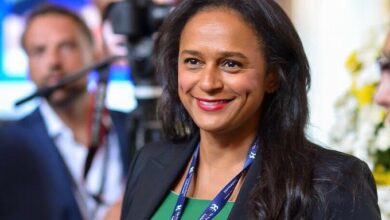
Angola’s Supreme Court Orders Seizure Of Former President’s Daughter’s Assets
Angola’s Supreme Court on Tuesday ordered the preventive seizure of several assets of former president Jose Eduardo dos Santos’s daughter,…
Read More » -
Angola
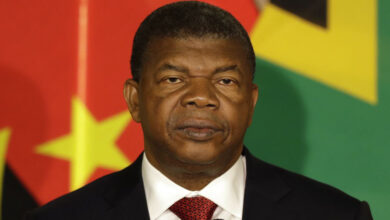
Angola’s Joao Lourenco Takes Oath As Country’s New President For Second Term
Angola’s President Joao Lourenco took the oath of office on Thursday for a second term after a disputed electoral victory…
Read More » -
Angola
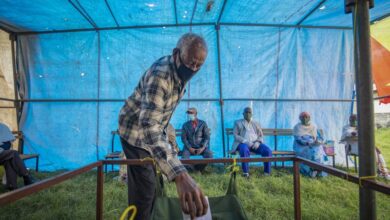
Angola’s Constitutional Court Rejects Opposition’s Plea To Nullify Poll Results
Angola’s Constitutional Court On Thursday rejected a complaint filed by the runner-up in the August presidential election seeking to nullify…
Read More » -
Angola
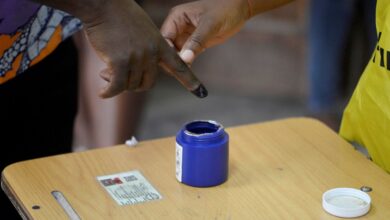
Angola’s Main Opposition Party Rejects Election Results, Files Legal Complaint
Angola’s opposition party has reportedly filed a complaint against the election results that declared the governing MPLA party as the…
Read More » -
Angola

Angola’s Election Result: Long Serving MPLA Ruling Party Wins Elections And Presidency
Angola’s National Electoral Commission on Monday officially announced President Joao Lourenco and his Popular Movement for the Liberation of Angola (MPLA)…
Read More » -
Angola
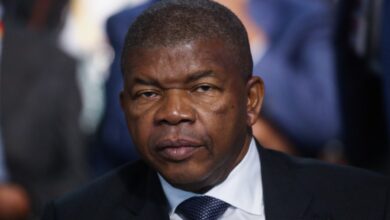
Angola’s Ruling Party MPLA Secures Strong Lead In Early Vote Counting Results
Angola’s electoral commission on Thursday said the ruling party has garnered a solid majority after nearly all votes were counted…
Read More » -
Angola

Angola’s Early Provisional Vote Counting Results Show MPLA Ahead Of UNITA
Angola’s National Electoral Commission (CNE) on Thursday said the first provisional vote counting results from indicate the People’s Movement for the…
Read More » -
Angola
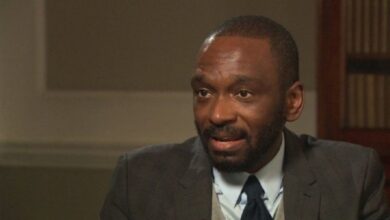
Angola: Son of Ex-President Eduardo Dos Santos Sentenced To Five Years Jail
Angola’s Supreme Court on Friday sentenced Jose Filomeno dos Santos, the son of Angola’s former president Eduardo Dos Santos, to…
Read More » -
Angola

Angola, Eritrea, And Uganda Report First Confirmed Coronavirus Cases
Angola, Eritrea, and Uganda have reported their first confirmed cases of coronavirus, while Mauritius has recorded its first death from…
Read More » -
Angola
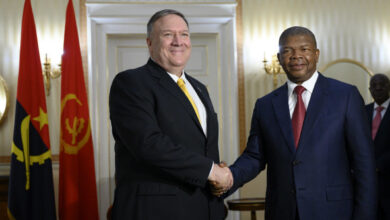
Angola: U.S. Secretary of State Mike Pompeo Praises President Joao Lourenco’s Work
U.S. Secretary of State Mike Pompeo on Monday praised Angola’s President Joao Lourenco for his tough stance and action against…
Read More »

